Psychology of Learning (ABPK3202): Cognitive & Social Learning Report
VerifiedAdded on 2022/11/24
|6
|1539
|93
Report
AI Summary
This psychology report delves into the concepts of cognitive and social learning theories, examining their relevance to individual experiences. The report begins with an introduction that outlines the scope of psychology and the two chosen theories. Cognitive theory, focusing on internal mental processes like memory and thinking, is explored alongside social learning theory, which emphasizes learning through observation and imitation. The report provides detailed explanations of each theory, supported by research, and relates them to the author's personal experiences, such as the influence of observing a classmate's punctuality. The analysis includes discussions on vicarious reinforcement and the impact of social learning on behaviors. The conclusion summarizes the key takeaways and highlights the interconnectedness of the theories, emphasizing their role in understanding learning processes and shaping future behavior. The report also includes a list of references used to support the discussion.
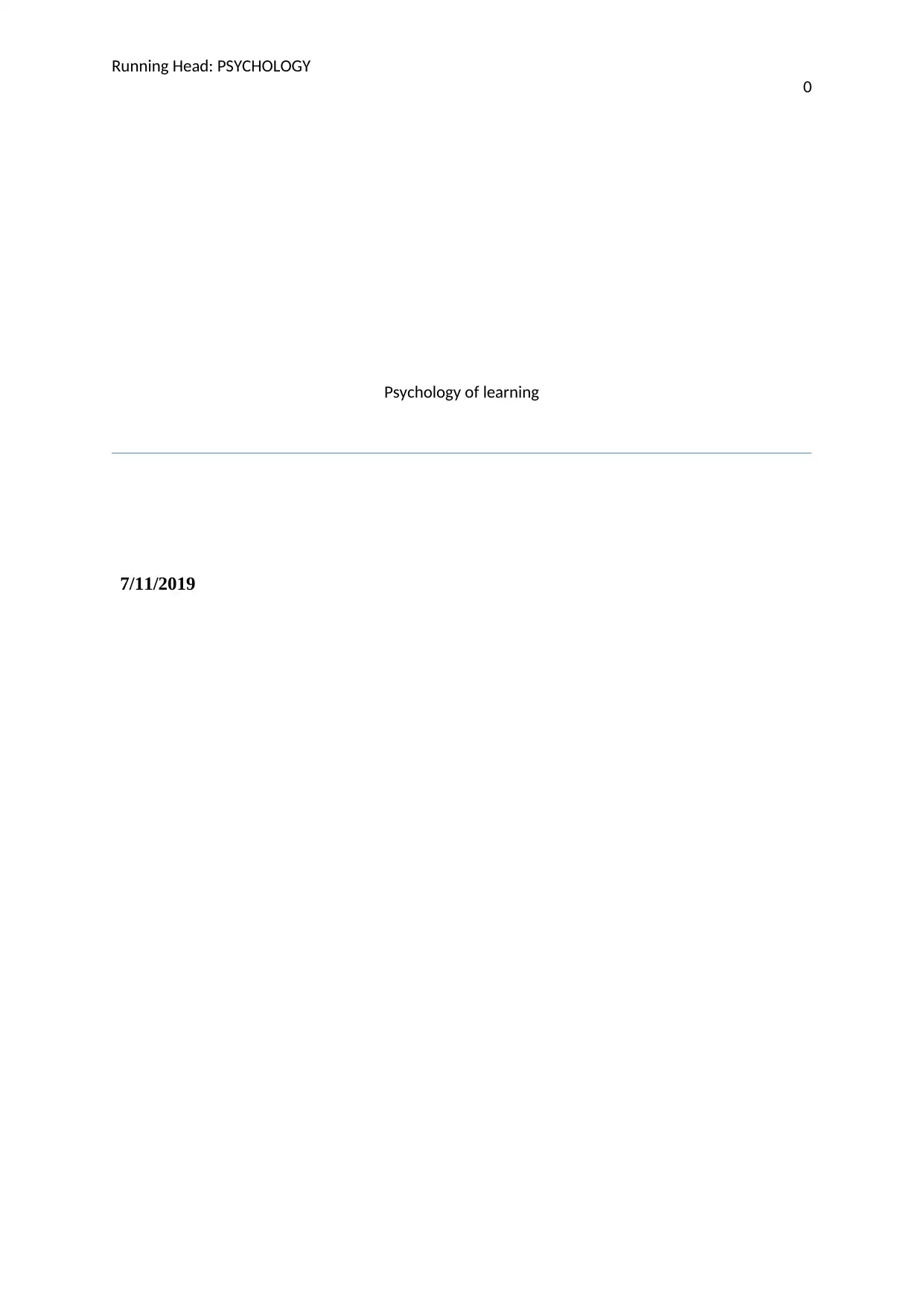
Running Head: PSYCHOLOGY
0
Psychology of learning
7/11/2019
0
Psychology of learning
7/11/2019
Paraphrase This Document
Need a fresh take? Get an instant paraphrase of this document with our AI Paraphraser

PSYCHOLOGY
1
Contents
Introduction...........................................................................................................................................3
Two theories of psychology...................................................................................................................3
Cognitive theory of psychology.........................................................................................................3
Social learning theory........................................................................................................................3
Conclusion.............................................................................................................................................5
References.............................................................................................................................................6
1
Contents
Introduction...........................................................................................................................................3
Two theories of psychology...................................................................................................................3
Cognitive theory of psychology.........................................................................................................3
Social learning theory........................................................................................................................3
Conclusion.............................................................................................................................................5
References.............................................................................................................................................6
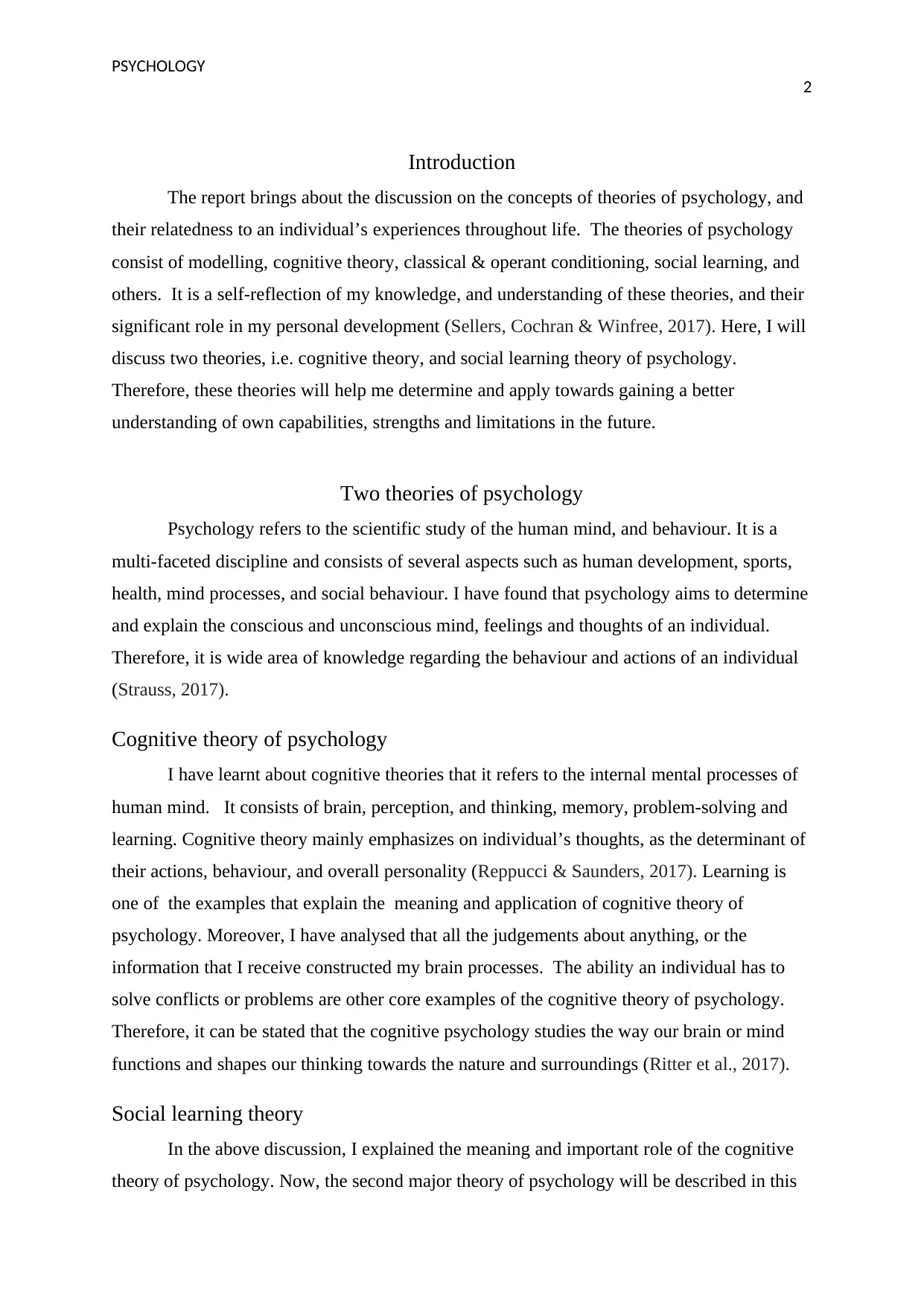
PSYCHOLOGY
2
Introduction
The report brings about the discussion on the concepts of theories of psychology, and
their relatedness to an individual’s experiences throughout life. The theories of psychology
consist of modelling, cognitive theory, classical & operant conditioning, social learning, and
others. It is a self-reflection of my knowledge, and understanding of these theories, and their
significant role in my personal development (Sellers, Cochran & Winfree, 2017). Here, I will
discuss two theories, i.e. cognitive theory, and social learning theory of psychology.
Therefore, these theories will help me determine and apply towards gaining a better
understanding of own capabilities, strengths and limitations in the future.
Two theories of psychology
Psychology refers to the scientific study of the human mind, and behaviour. It is a
multi-faceted discipline and consists of several aspects such as human development, sports,
health, mind processes, and social behaviour. I have found that psychology aims to determine
and explain the conscious and unconscious mind, feelings and thoughts of an individual.
Therefore, it is wide area of knowledge regarding the behaviour and actions of an individual
(Strauss, 2017).
Cognitive theory of psychology
I have learnt about cognitive theories that it refers to the internal mental processes of
human mind. It consists of brain, perception, and thinking, memory, problem-solving and
learning. Cognitive theory mainly emphasizes on individual’s thoughts, as the determinant of
their actions, behaviour, and overall personality (Reppucci & Saunders, 2017). Learning is
one of the examples that explain the meaning and application of cognitive theory of
psychology. Moreover, I have analysed that all the judgements about anything, or the
information that I receive constructed my brain processes. The ability an individual has to
solve conflicts or problems are other core examples of the cognitive theory of psychology.
Therefore, it can be stated that the cognitive psychology studies the way our brain or mind
functions and shapes our thinking towards the nature and surroundings (Ritter et al., 2017).
Social learning theory
In the above discussion, I explained the meaning and important role of the cognitive
theory of psychology. Now, the second major theory of psychology will be described in this
2
Introduction
The report brings about the discussion on the concepts of theories of psychology, and
their relatedness to an individual’s experiences throughout life. The theories of psychology
consist of modelling, cognitive theory, classical & operant conditioning, social learning, and
others. It is a self-reflection of my knowledge, and understanding of these theories, and their
significant role in my personal development (Sellers, Cochran & Winfree, 2017). Here, I will
discuss two theories, i.e. cognitive theory, and social learning theory of psychology.
Therefore, these theories will help me determine and apply towards gaining a better
understanding of own capabilities, strengths and limitations in the future.
Two theories of psychology
Psychology refers to the scientific study of the human mind, and behaviour. It is a
multi-faceted discipline and consists of several aspects such as human development, sports,
health, mind processes, and social behaviour. I have found that psychology aims to determine
and explain the conscious and unconscious mind, feelings and thoughts of an individual.
Therefore, it is wide area of knowledge regarding the behaviour and actions of an individual
(Strauss, 2017).
Cognitive theory of psychology
I have learnt about cognitive theories that it refers to the internal mental processes of
human mind. It consists of brain, perception, and thinking, memory, problem-solving and
learning. Cognitive theory mainly emphasizes on individual’s thoughts, as the determinant of
their actions, behaviour, and overall personality (Reppucci & Saunders, 2017). Learning is
one of the examples that explain the meaning and application of cognitive theory of
psychology. Moreover, I have analysed that all the judgements about anything, or the
information that I receive constructed my brain processes. The ability an individual has to
solve conflicts or problems are other core examples of the cognitive theory of psychology.
Therefore, it can be stated that the cognitive psychology studies the way our brain or mind
functions and shapes our thinking towards the nature and surroundings (Ritter et al., 2017).
Social learning theory
In the above discussion, I explained the meaning and important role of the cognitive
theory of psychology. Now, the second major theory of psychology will be described in this
⊘ This is a preview!⊘
Do you want full access?
Subscribe today to unlock all pages.

Trusted by 1+ million students worldwide
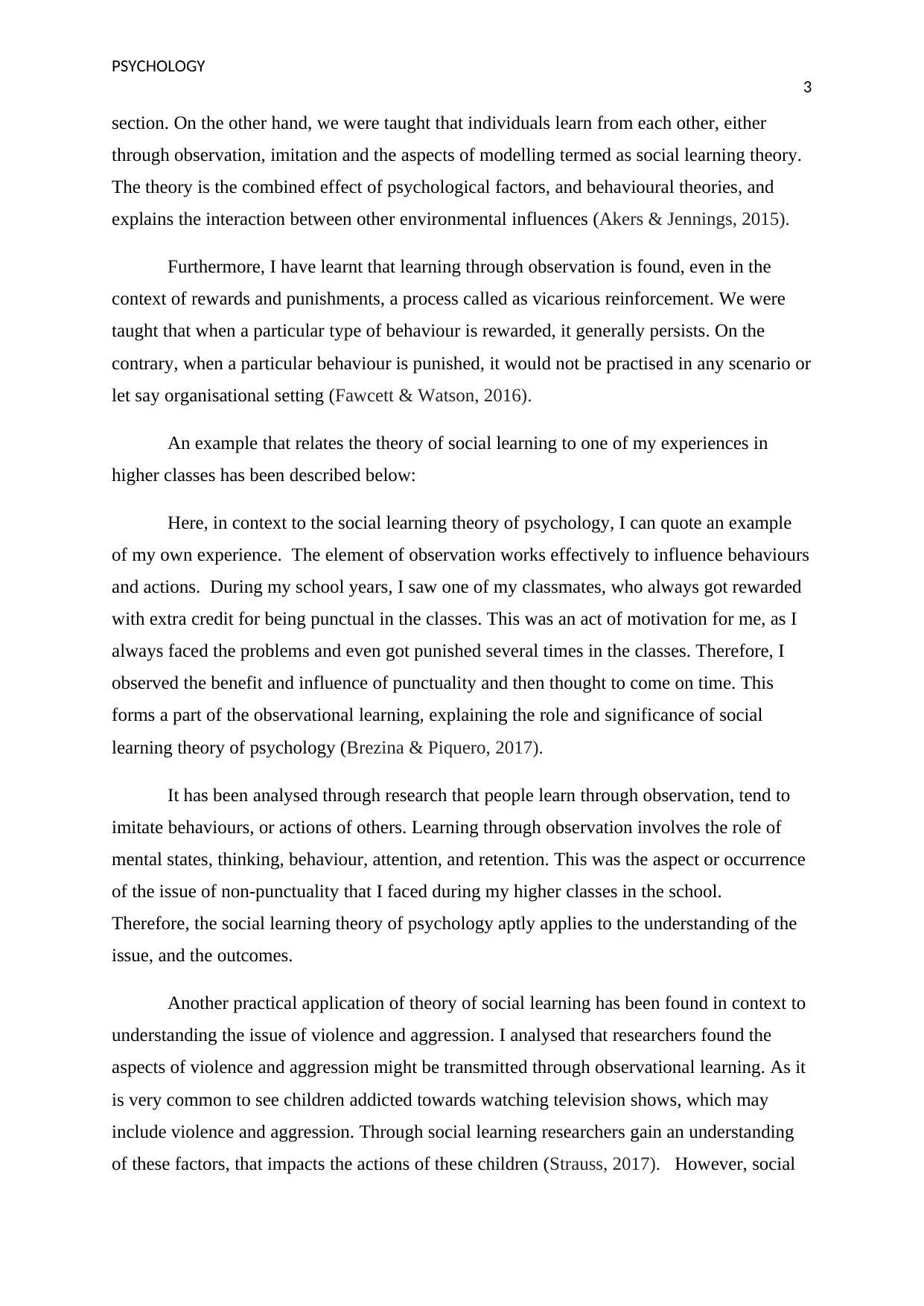
PSYCHOLOGY
3
section. On the other hand, we were taught that individuals learn from each other, either
through observation, imitation and the aspects of modelling termed as social learning theory.
The theory is the combined effect of psychological factors, and behavioural theories, and
explains the interaction between other environmental influences (Akers & Jennings, 2015).
Furthermore, I have learnt that learning through observation is found, even in the
context of rewards and punishments, a process called as vicarious reinforcement. We were
taught that when a particular type of behaviour is rewarded, it generally persists. On the
contrary, when a particular behaviour is punished, it would not be practised in any scenario or
let say organisational setting (Fawcett & Watson, 2016).
An example that relates the theory of social learning to one of my experiences in
higher classes has been described below:
Here, in context to the social learning theory of psychology, I can quote an example
of my own experience. The element of observation works effectively to influence behaviours
and actions. During my school years, I saw one of my classmates, who always got rewarded
with extra credit for being punctual in the classes. This was an act of motivation for me, as I
always faced the problems and even got punished several times in the classes. Therefore, I
observed the benefit and influence of punctuality and then thought to come on time. This
forms a part of the observational learning, explaining the role and significance of social
learning theory of psychology (Brezina & Piquero, 2017).
It has been analysed through research that people learn through observation, tend to
imitate behaviours, or actions of others. Learning through observation involves the role of
mental states, thinking, behaviour, attention, and retention. This was the aspect or occurrence
of the issue of non-punctuality that I faced during my higher classes in the school.
Therefore, the social learning theory of psychology aptly applies to the understanding of the
issue, and the outcomes.
Another practical application of theory of social learning has been found in context to
understanding the issue of violence and aggression. I analysed that researchers found the
aspects of violence and aggression might be transmitted through observational learning. As it
is very common to see children addicted towards watching television shows, which may
include violence and aggression. Through social learning researchers gain an understanding
of these factors, that impacts the actions of these children (Strauss, 2017). However, social
3
section. On the other hand, we were taught that individuals learn from each other, either
through observation, imitation and the aspects of modelling termed as social learning theory.
The theory is the combined effect of psychological factors, and behavioural theories, and
explains the interaction between other environmental influences (Akers & Jennings, 2015).
Furthermore, I have learnt that learning through observation is found, even in the
context of rewards and punishments, a process called as vicarious reinforcement. We were
taught that when a particular type of behaviour is rewarded, it generally persists. On the
contrary, when a particular behaviour is punished, it would not be practised in any scenario or
let say organisational setting (Fawcett & Watson, 2016).
An example that relates the theory of social learning to one of my experiences in
higher classes has been described below:
Here, in context to the social learning theory of psychology, I can quote an example
of my own experience. The element of observation works effectively to influence behaviours
and actions. During my school years, I saw one of my classmates, who always got rewarded
with extra credit for being punctual in the classes. This was an act of motivation for me, as I
always faced the problems and even got punished several times in the classes. Therefore, I
observed the benefit and influence of punctuality and then thought to come on time. This
forms a part of the observational learning, explaining the role and significance of social
learning theory of psychology (Brezina & Piquero, 2017).
It has been analysed through research that people learn through observation, tend to
imitate behaviours, or actions of others. Learning through observation involves the role of
mental states, thinking, behaviour, attention, and retention. This was the aspect or occurrence
of the issue of non-punctuality that I faced during my higher classes in the school.
Therefore, the social learning theory of psychology aptly applies to the understanding of the
issue, and the outcomes.
Another practical application of theory of social learning has been found in context to
understanding the issue of violence and aggression. I analysed that researchers found the
aspects of violence and aggression might be transmitted through observational learning. As it
is very common to see children addicted towards watching television shows, which may
include violence and aggression. Through social learning researchers gain an understanding
of these factors, that impacts the actions of these children (Strauss, 2017). However, social
Paraphrase This Document
Need a fresh take? Get an instant paraphrase of this document with our AI Paraphraser
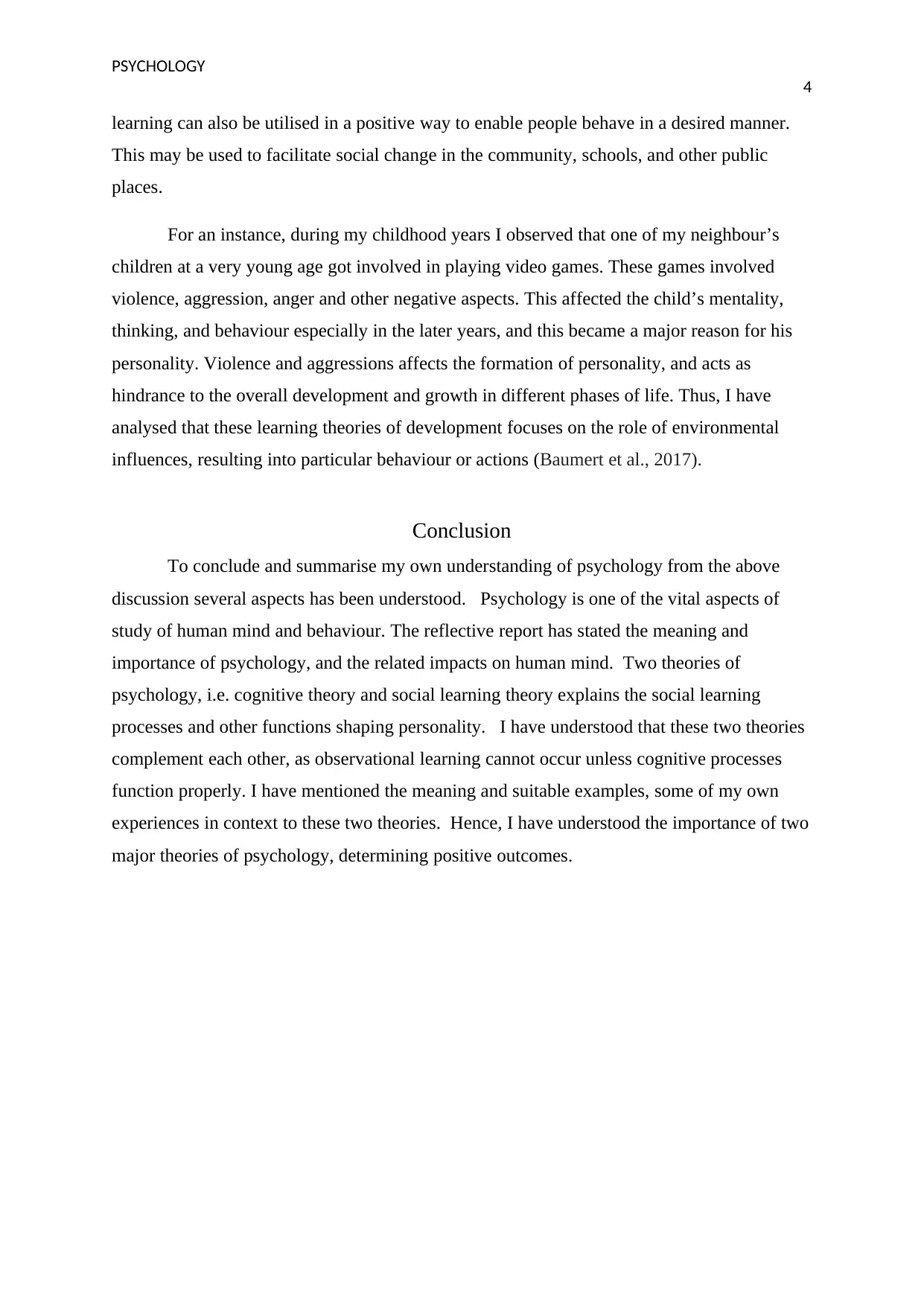
PSYCHOLOGY
4
learning can also be utilised in a positive way to enable people behave in a desired manner.
This may be used to facilitate social change in the community, schools, and other public
places.
For an instance, during my childhood years I observed that one of my neighbour’s
children at a very young age got involved in playing video games. These games involved
violence, aggression, anger and other negative aspects. This affected the child’s mentality,
thinking, and behaviour especially in the later years, and this became a major reason for his
personality. Violence and aggressions affects the formation of personality, and acts as
hindrance to the overall development and growth in different phases of life. Thus, I have
analysed that these learning theories of development focuses on the role of environmental
influences, resulting into particular behaviour or actions (Baumert et al., 2017).
Conclusion
To conclude and summarise my own understanding of psychology from the above
discussion several aspects has been understood. Psychology is one of the vital aspects of
study of human mind and behaviour. The reflective report has stated the meaning and
importance of psychology, and the related impacts on human mind. Two theories of
psychology, i.e. cognitive theory and social learning theory explains the social learning
processes and other functions shaping personality. I have understood that these two theories
complement each other, as observational learning cannot occur unless cognitive processes
function properly. I have mentioned the meaning and suitable examples, some of my own
experiences in context to these two theories. Hence, I have understood the importance of two
major theories of psychology, determining positive outcomes.
4
learning can also be utilised in a positive way to enable people behave in a desired manner.
This may be used to facilitate social change in the community, schools, and other public
places.
For an instance, during my childhood years I observed that one of my neighbour’s
children at a very young age got involved in playing video games. These games involved
violence, aggression, anger and other negative aspects. This affected the child’s mentality,
thinking, and behaviour especially in the later years, and this became a major reason for his
personality. Violence and aggressions affects the formation of personality, and acts as
hindrance to the overall development and growth in different phases of life. Thus, I have
analysed that these learning theories of development focuses on the role of environmental
influences, resulting into particular behaviour or actions (Baumert et al., 2017).
Conclusion
To conclude and summarise my own understanding of psychology from the above
discussion several aspects has been understood. Psychology is one of the vital aspects of
study of human mind and behaviour. The reflective report has stated the meaning and
importance of psychology, and the related impacts on human mind. Two theories of
psychology, i.e. cognitive theory and social learning theory explains the social learning
processes and other functions shaping personality. I have understood that these two theories
complement each other, as observational learning cannot occur unless cognitive processes
function properly. I have mentioned the meaning and suitable examples, some of my own
experiences in context to these two theories. Hence, I have understood the importance of two
major theories of psychology, determining positive outcomes.
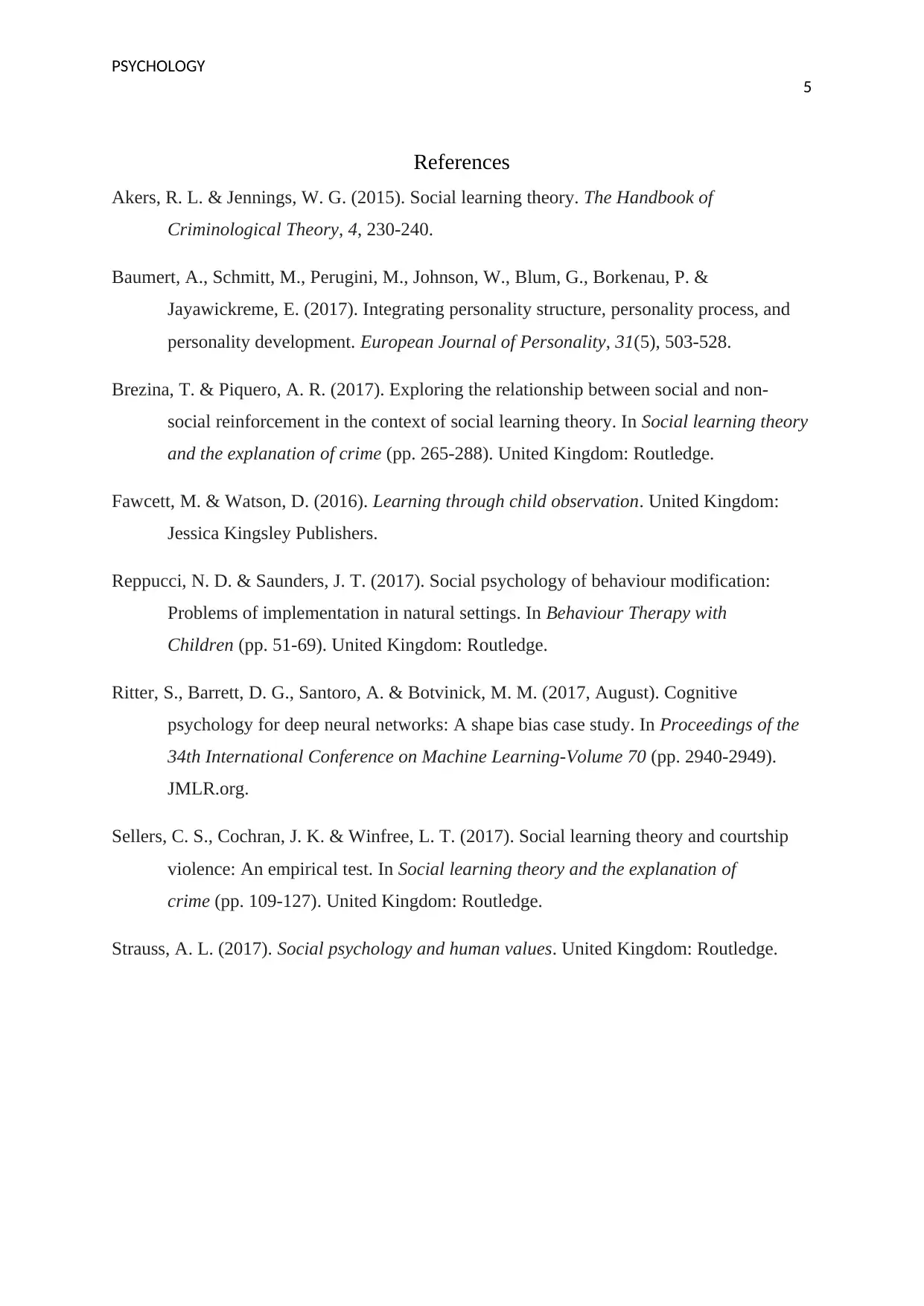
PSYCHOLOGY
5
References
Akers, R. L. & Jennings, W. G. (2015). Social learning theory. The Handbook of
Criminological Theory, 4, 230-240.
Baumert, A., Schmitt, M., Perugini, M., Johnson, W., Blum, G., Borkenau, P. &
Jayawickreme, E. (2017). Integrating personality structure, personality process, and
personality development. European Journal of Personality, 31(5), 503-528.
Brezina, T. & Piquero, A. R. (2017). Exploring the relationship between social and non-
social reinforcement in the context of social learning theory. In Social learning theory
and the explanation of crime (pp. 265-288). United Kingdom: Routledge.
Fawcett, M. & Watson, D. (2016). Learning through child observation. United Kingdom:
Jessica Kingsley Publishers.
Reppucci, N. D. & Saunders, J. T. (2017). Social psychology of behaviour modification:
Problems of implementation in natural settings. In Behaviour Therapy with
Children (pp. 51-69). United Kingdom: Routledge.
Ritter, S., Barrett, D. G., Santoro, A. & Botvinick, M. M. (2017, August). Cognitive
psychology for deep neural networks: A shape bias case study. In Proceedings of the
34th International Conference on Machine Learning-Volume 70 (pp. 2940-2949).
JMLR.org.
Sellers, C. S., Cochran, J. K. & Winfree, L. T. (2017). Social learning theory and courtship
violence: An empirical test. In Social learning theory and the explanation of
crime (pp. 109-127). United Kingdom: Routledge.
Strauss, A. L. (2017). Social psychology and human values. United Kingdom: Routledge.
5
References
Akers, R. L. & Jennings, W. G. (2015). Social learning theory. The Handbook of
Criminological Theory, 4, 230-240.
Baumert, A., Schmitt, M., Perugini, M., Johnson, W., Blum, G., Borkenau, P. &
Jayawickreme, E. (2017). Integrating personality structure, personality process, and
personality development. European Journal of Personality, 31(5), 503-528.
Brezina, T. & Piquero, A. R. (2017). Exploring the relationship between social and non-
social reinforcement in the context of social learning theory. In Social learning theory
and the explanation of crime (pp. 265-288). United Kingdom: Routledge.
Fawcett, M. & Watson, D. (2016). Learning through child observation. United Kingdom:
Jessica Kingsley Publishers.
Reppucci, N. D. & Saunders, J. T. (2017). Social psychology of behaviour modification:
Problems of implementation in natural settings. In Behaviour Therapy with
Children (pp. 51-69). United Kingdom: Routledge.
Ritter, S., Barrett, D. G., Santoro, A. & Botvinick, M. M. (2017, August). Cognitive
psychology for deep neural networks: A shape bias case study. In Proceedings of the
34th International Conference on Machine Learning-Volume 70 (pp. 2940-2949).
JMLR.org.
Sellers, C. S., Cochran, J. K. & Winfree, L. T. (2017). Social learning theory and courtship
violence: An empirical test. In Social learning theory and the explanation of
crime (pp. 109-127). United Kingdom: Routledge.
Strauss, A. L. (2017). Social psychology and human values. United Kingdom: Routledge.
⊘ This is a preview!⊘
Do you want full access?
Subscribe today to unlock all pages.

Trusted by 1+ million students worldwide
1 out of 6
Related Documents
Your All-in-One AI-Powered Toolkit for Academic Success.
+13062052269
info@desklib.com
Available 24*7 on WhatsApp / Email
![[object Object]](/_next/static/media/star-bottom.7253800d.svg)
Unlock your academic potential
Copyright © 2020–2026 A2Z Services. All Rights Reserved. Developed and managed by ZUCOL.





